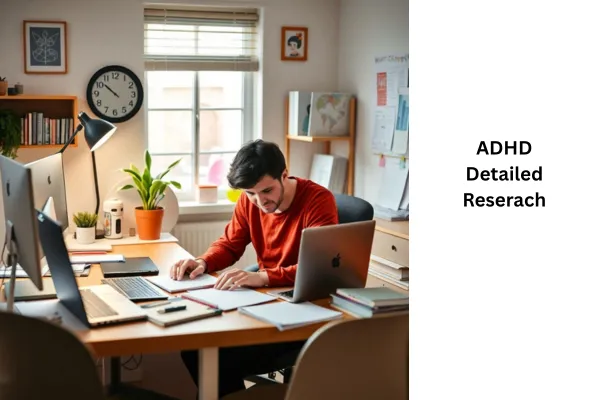
Why People with ADHD Can't Feel When They're Hungry
Why People with ADHD Can't Feel When They're Hungry, Tired, or Need the Bathroom
What's happening in your body when your brain works differently
Ever wonder why you suddenly realize you're absolutely starving but had no clue until that moment? Or why you routinely push through exhaustion until you crash completely? If you have ADHD, your interoception—your body's internal sensing system—might be working differently than you think.
You weren't made to ignore your body's signals.
This post is for people who feel disconnected—who know there's something off about the way they experience hunger, emotions, and physical needs, but couldn't quite name it.
It's not just about missing signals.
It's about reclaiming awareness.
Through neurodivergent insight, research-backed understanding, and practical strategies that reject the "just try harder" mentality.
What Is Interoception? The Sense You Never Knew You Had
Interoception is your body's ability to perceive its internal state—the signals telling you when you're hungry, thirsty, hot, cold, in pain, or even experiencing emotions. It's the reason most people know when they need to use the bathroom before it becomes an emergency, or can tell when they're getting hungry.
But if you have ADHD, this critical sensing system often works differently.
Research shows that people with ADHD frequently have altered interoceptive awareness. In scientific studies using heartbeat perception tasks (where participants count their own heartbeats without taking their pulse), those with ADHD consistently show lower accuracy.
Brain imaging confirms this difference—fMRI studies reveal reduced activation in the insula and anterior cingulate cortex, the brain regions responsible for processing these internal signals.
The "Wait, I'm Starving!" Phenomenon: How ADHD Disrupts Body Signals
This isn't laziness. This is neurology.
When your interoception is compromised, you might experience:
Suddenly realizing you're ravenously hungry with no prior warning
Not noticing you need the bathroom until it's urgent
Pushing through exhaustion until you crash completely
Feeling emotions "explode" without recognizing the build-up
Difficulty connecting physical sensations to emotions (not realizing anxiety is causing your stomachache)
This altered awareness isn't your fault—it's how your brain is wired. ADHD brains are often externally focused, tuned to pick up environmental cues while internal signals get filtered out as "background noise."
Beyond Hunger: The Surprising Ways Interoception Affects Your Life
The impact of altered interoception extends far beyond occasionally skipping meals:
Time Blindness Connection
That notorious ADHD "time blindness"? Research suggests it may be directly connected to interoception. Your sense of time passing relies partly on internal bodily rhythms and signals—when these signals are muted, your time perception suffers.
Emotional Regulation Challenges
Ever feel emotionally overwhelmed without warning? The physical sensations that normally precede emotional responses (increased heart rate, muscle tension) might not register until the emotion is already overwhelming.
Studies show significant overlap between ADHD and alexithymia—difficulty identifying and describing emotions—with much higher rates in the ADHD population compared to neurotypicals.
The Gut-Brain Connection
The gut-brain axis (the communication pathway between your digestive system and brain) adds another layer of complexity. Research indicates that alterations in gut microbiota can influence ADHD symptoms, potentially through interoceptive pathways.
One fascinating area of study involves compounds like capsaicin (found in chili peppers) and how they might affect both gut microbiota and neurotransmitter levels that impact interoceptive signals.
Interoception Profiles: It's Not One-Size-Fits-All
Interoception differences in ADHD aren't uniform—they generally fall into three profiles:
Under-responsivity: Physical sensations don't register until they're intense (suddenly realizing you're starving)
Over-responsivity: Heightened awareness of certain bodily sensations (feeling every heartbeat during anxiety)
Poor discrimination: Difficulty identifying what sensations mean (confusing anxiety with hunger)
Understanding your personal profile is the first step toward developing strategies that work for you.
Reclaiming Your Body Awareness: Practical Approaches
Rather than fighting your neurodivergent brain, work with it:
External Reminders for Internal Processes
Set regular timers for meals, breaks, and bathroom visits
Use apps that remind you to check in with your body's needs
Create visual cues in your environment (water bottle on desk)
Body Scan Practices
Brief body scan meditations—even just 2-3 minutes—can strengthen interoceptive pathways over time. Start with once daily and build the habit gradually.
Movement Breaks
Physical activity temporarily boosts interoceptive awareness. A quick 5-minute movement break can help you reconnect with bodily sensations.
Leveraging Hyperfocus for Awareness
Use transition moments between tasks as triggers to check in with your body. The cognitive shift creates a natural pause for awareness.
The Liberation of Understanding
Recognizing that your interoception works differently isn't admitting defeat—it's the first step toward liberation from shame and confusion.
When you understand that missing hunger cues or emotional signals isn't laziness or carelessness but a neurological difference, you can develop compassionate systems that work with your brain rather than against it.
This knowledge doesn't just improve self-care—it transforms your relationship with your body and mind.
Moving Forward: Self-Compassion as a Practice
The path to better interoceptive awareness starts with self-compassion. Your brain processes information differently. This isn't a character flaw—it's neurodiversity in action.
Instead of forcing neurotypical expectations on your neurodivergent brain, build external systems that support your internal awareness. Use technology, visual cues, and community support to bridge the gap between what your body needs and what your brain perceives.
Remember: you weren't built for ignoring your needs—you were built for thriving on your own terms, with systems that honor how your unique brain works.
